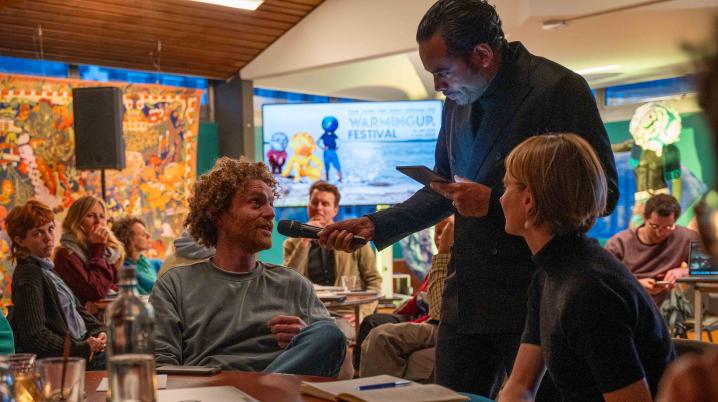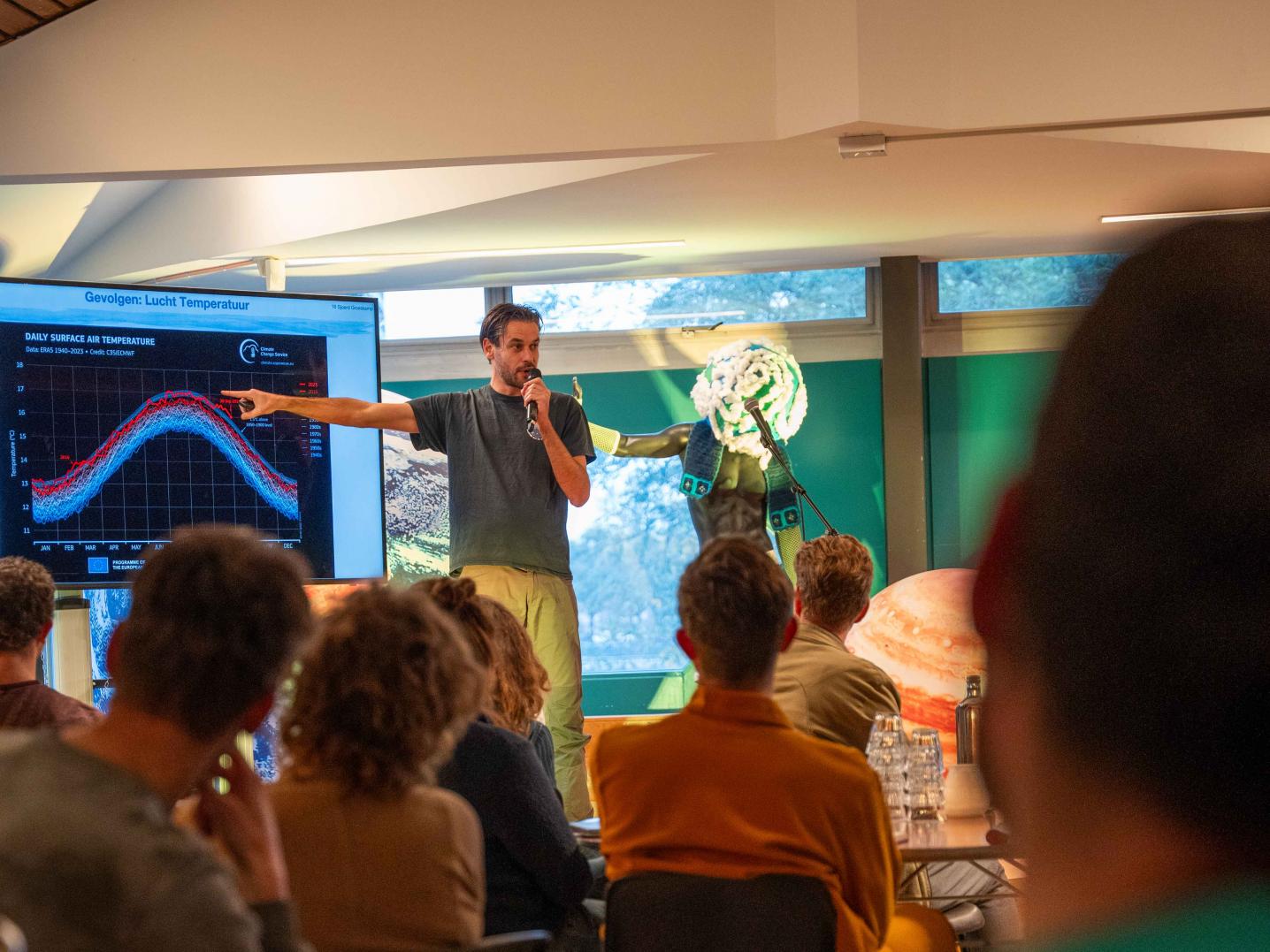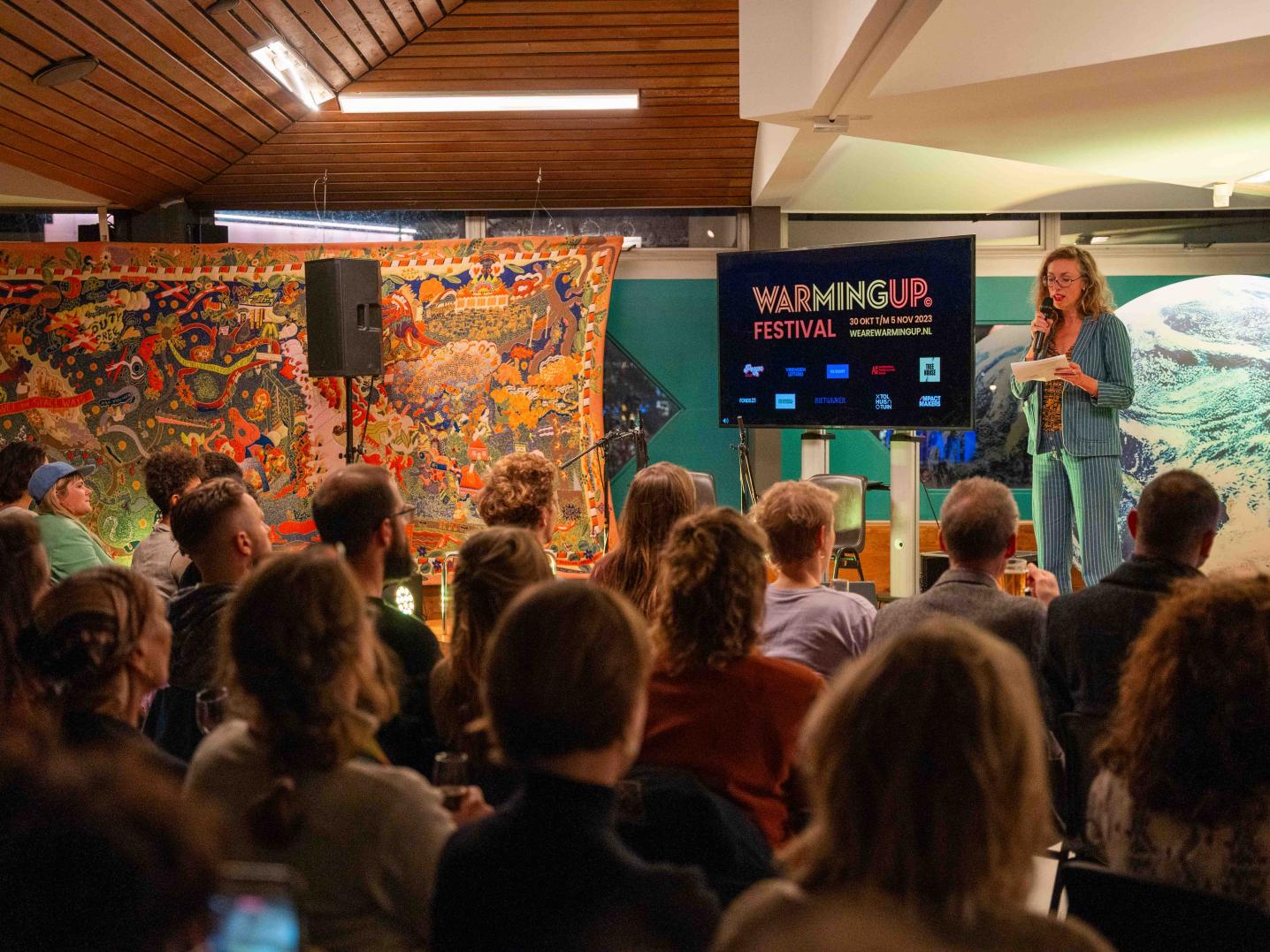


We need the imaginative power of culture to bring knowledge about the climate crisis to a wider public. That was the central message of the industry gathering and opening of the Warming Up Festival in Amsterdam on 2 November.
As a cultural organisation, how do you go about making the climate issue a part of your programming? How can you translate climate ambitions into organisational principles? And what does the climate crisis mean for international cultural cooperation? These were some of the questions that sixty culture professionals discussed during the industry gathering at the Warming Up Festival 2023. It was the fourth edition of this festival, which centres around the climate issue from an arts and media perspective and is organised by Tolhuistuin and Stichting Impact Makers.
Physical oceanographer and theatre maker Sjoerd Groeskamp gave a crash course on the latest scientific insights into the climate crisis, and explained why he, as a scientist, uses opinion pieces and theatre shows as a vehicle to reach out to the general public. He believes that culture can touch people and create a social movement. “We have been sending reports to policymakers for years, but we need to get everybody on board to realise real change. The cultural sector has the power to tell stories,” he explains in his podcast Overvloed (Abundance). This approach fits perfectly with the ambitions of the Warming Up Festival, which uses an art tour, workshops and a film programme (among other things) to generate more awareness of the climate issue.
It was therefore also a natural fit for this industry gathering, which aimed to explore further ways in which the cultural sector can help drive this movement. In several brainstorming sessions led by DutchCulture, Eurosonic Noorderslag (ESNS), the Netherlands Association for the Performing Arts (Nederlandse Associatie voor Podiumkunsten; NAPK) and Tolhuistuin, the participants discussed how the cultural sector could approach this issue.

What is the future of international cultural cooperation in the climate crisis? That was the central question on the table during the brainstorming session with DutchCulture. The participants, who were mostly active in the performing arts, indicated that sustainable international cultural cooperation is a high priority for their organisations. Various climate objectives that are already being put into practice: distances below 800 kilometres are travelled by train, performances are combined so that multiple venues can be visited in a single trip, and invitations from abroad are weighed against the environmental impact of the required travel.
However, organisations are sometimes faced with dilemmas. International cooperation necessitates working with partners, after all, but those partners do not necessarily uphold the same standards or ambitions with regard to sustainability. When receiving an invitation from a partner who offers to pay for the company’s travel and transportation of décor pieces, for example, it can be difficult to request a more sustainable but also more time-consuming and expensive alternative. Meanwhile, for many organisations, reducing their international activities directly compromises their identity.

In the coming months, many if not all cultural organisations will be developing and writing long-term plans for the period up to 2028, for example for the Culturele Basisinfrastructuur (BIS) or Kunstenplan subsidies. This period connects almost seamlessly with the European target year of 2030 for the realisation of the climate goals. In short: action is needed right now.
An important first step for many organisations is performing a baseline measurement of the climate impact of their operations, travels and specific projects. Based on that, they can then develop plans for the future. Exchanging experiences on this day – what we are already doing, the issues we have encountered and how we see the future – has already yielded a lot of valuable information that can help inform these plans.
Finally, a practical tip: several organisations, including the theatre companies Collectief Walden and Jakop Ahlbom Company as well as NAPK, ESNS and Tolhuistuin, have taken the initiative to formulate the statement TE ZIJN OF NIET TE ZIJN (to be or not to be), in which they declare a climate emergency. Everyone can sign this statement, and more than ninety cultural organisations have already done so. To help these organisations better formulate their climate objectives, this initiative also offers suggestions for concrete actions that can be implemented on stage, behind the scenes, during productions and in their role as drivers of social change.